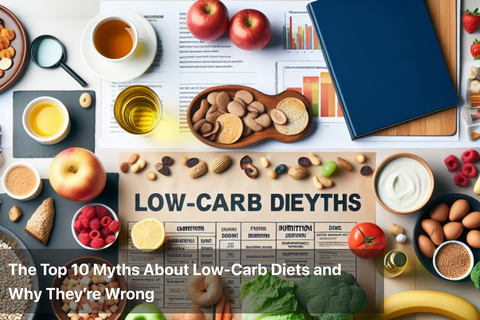
How Does a Low-Carb Diet Affect Your Gut Health?
Gut health plays a vital role in overall well-being. It influences digestion, nutrient absorption, immunity, energy levels, and even mood. What you eat directly impacts the balance of bacteria in your digestive system, known as the gut microbiome. With the growing popularity of low-carb diets, many are beginning to ask how such dietary changes affect the gut, especially since carbs—particularly fiber-rich ones—are typically associated with feeding beneficial gut bacteria.
A low-carb diet restricts carbohydrate intake in favor of protein and fat, which can lead to a shift in the composition of the gut microbiome. Depending on how the diet is structured, this shift can either support or disrupt gut health. Understanding the relationship between carbohydrate intake and gut bacteria is essential for optimizing digestive health while following a low-carb lifestyle.

How the Gut Microbiome Works
The gut microbiome is a complex ecosystem of trillions of bacteria, fungi, and other microorganisms that live in the digestive tract. These microbes help digest food, synthesize vitamins, regulate the immune system, and maintain the integrity of the intestinal lining. A balanced microbiome supports good health, while an imbalanced one—called dysbiosis—can lead to digestive disorders, inflammation, and chronic illness.
Carbohydrates, especially those high in fiber like whole vegetables, nuts, and seeds, serve as prebiotics—food for beneficial bacteria. When carb intake is drastically reduced without thoughtful planning, it may affect the diversity and function of gut microbes.
Causes of Gut Health Issues on a Low-Carb Diet
|
Cause |
Explanation |
|---|---|
|
Lack of dietary fiber |
Insufficient prebiotics to feed good bacteria |
|
Excess animal protein |
May increase certain harmful bacteria if unbalanced |
|
Too many processed low-carb foods |
Artificial sweeteners and additives disrupt microbial balance |
|
Sudden carb restriction |
Can lead to temporary changes in digestion and microbiota |
|
Low intake of plant-based foods |
Reduces phytonutrients and antioxidants that support gut health |
Common Symptoms of Gut Imbalance
-
Constipation or irregular bowel movements
-
Bloating and gas
-
Acid reflux or indigestion
-
Cramping or abdominal discomfort
-
Fatigue or brain fog
-
Weakened immune response
-
Bad breath or coated tongue
Positive Effects of a Well-Balanced Low-Carb Diet on Gut Health
-
Reduced Inflammation
Cutting out sugar and refined carbohydrates can lower inflammation in the gut, which helps improve symptoms of IBS, leaky gut, and autoimmune conditions. -
Fewer Digestive Irritants
Many people are sensitive to gluten, dairy, or excess sugar. A low-carb diet often eliminates these triggers, supporting gut healing. -
Improved Bacterial Diversity with Fiber-Rich Low-Carb Foods
When structured well with non-starchy vegetables, nuts, seeds, and fermented foods, a low-carb diet can still provide plenty of prebiotics and probiotics. -
Better Blood Sugar Control
Stable blood sugar levels reduce systemic stress and inflammation, indirectly benefiting the gut.
Precautions When Starting a Low-Carb Diet for Gut Health
Transitioning to a low-carb diet may initially disrupt digestion. These effects are usually temporary but can be managed with simple strategies:
-
Increase water intake to prevent constipation
-
Include plenty of fiber-rich low-carb vegetables such as spinach, broccoli, zucchini, and kale
-
Add fermented foods like sauerkraut, kimchi, and yogurt to promote healthy bacteria
-
Use magnesium-rich foods or supplements to support regular bowel movements
-
Transition gradually to give the digestive system time to adapt
Best Low-Carb Foods That Support Gut Health
|
Food |
Gut Health Benefit |
|---|---|
|
Chia seeds |
High in fiber and omega-3s, promote bowel regularity |
|
Leafy greens |
Provide antioxidants and gentle prebiotic fiber |
|
Asparagus |
Contains inulin, a prebiotic that feeds good bacteria |
|
Coconut yogurt |
A dairy-free probiotic-rich alternative |
|
Avocados |
High in fiber and healthy fats |
|
Almonds and walnuts |
Offer both fiber and polyphenols for microbial diversity |
|
Kimchi and sauerkraut |
Natural probiotics that support microbial balance |
|
Garlic and onions (in moderation) |
Rich in prebiotic compounds |

When to Seek Guidance
Although a low-carb diet can benefit gut health, some people may experience persistent digestive discomfort if the diet is unbalanced or too restrictive. Individuals with a history of digestive issues, IBS, Crohn’s disease, or food intolerances should consult a healthcare provider or nutritionist before making major dietary changes.
Signs that professional advice may be needed include:
-
Chronic constipation or diarrhea
-
Unexplained bloating or discomfort
-
Drastic weight loss or nutrient deficiencies
-
New food sensitivities
-
Fatigue not resolved with rest
Summary
A low-carb diet can have both positive and negative effects on gut health, depending on how it is structured. When built around whole, fiber-rich, and fermented foods, it can reduce inflammation, promote microbial balance, and improve digestion. However, drastic reduction in plant-based carbs or overreliance on processed foods may lead to digestive discomfort or imbalance.
Focusing on variety, hydration, and natural prebiotic and probiotic foods helps support a healthy gut while staying low-carb. Lofoods makes it easier to follow a gut-friendly low-carb lifestyle with wholesome, nutrient-dense products designed to nourish your body from the inside out.
This Blog post is an initiative by Lo! Foods, to provide accurate and Nutritionist / Doctor approved information related to Health. Lo! Foods is India's leading brand for Everyday Functional Foods. Foods designed for specific Health conditions or Needs. Lo! Foods also runs India's largest range of Low Carb Healthy Cloud Kitchens, under the brand names of Lo!, ProteinChef, ATH (All Things Healthy) and DiabeSmart.











Leave a comment
Your email address will not be published.